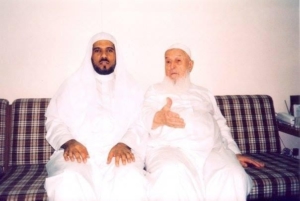The Trodden Path (Episode 13): Shaykh Wasfi al-Masaddi
In this series, Shaykh Shoayb Ahmed of South Africa will take us on a journey through the lives and biographies of some of the most celebrated and well known scholars of the twentieth and twenty – first century. These historical accounts will provide us with refreshing insights and lessons, and motivate us to follow in the footsteps of our pious predecessors.
In this thirteenth episode of the The Trodden Path series, Shaykh Shoayb Ahmed writes on the life of Shaykh Shaykh Wasfi al-Masaddi of Syria.

Shaykh Wasfi al-Masaddi (1335-1431=1917-2010)
Wasfī ibn Ahmad ibn Yusuf ibn Ahmad ibn ‘Abd al-Jalil was a devout scholar, a faqih and an excellent orator and a spiritual guide.
He was born in the city of Homs in Syria in 1917 (1335). His father was a scholar, while his mother was from the al-Jundi family.
His father, Shaykh Ahmad was closely connected to Shaykh Ahmad al-Tuzaqli al-Turkumani al-Naqshbandi who in turn was closely connected to Shaykh Khalid al-Naqshbandi.
He learnt the basic essentials of reading and writing and mathematics from his father. His father was an Imam and a teacher at one of the mosques in the city and he was the young Wasfi’s first Quran teacher.
After his elementary studies he enrolled at the al-Madrasa al-Waqfiyya that was under the supervision of Shaykh Muhammad Zahid al-Atasi (d.1366=1947). He studied at this institution for six years during which he studied Usul-Fiqh of the Hanafi madhhab, Nur al-Idah and the text of Mukhtasar al-Quduri and al-Kamil by al-Mubarrid all under Shaykh Zahid. Shaykh Wasfi resembled his teacher in his recitation of the Quran and in his gait.
Some of his other teachers were:
- Shaykh Muhammad Yasin Basmar with whom he studied Imam Nawawi’s collection of forty Hadith, Arabic Grammar, Logic and other subjects.
- His son, Shaykh Abu al-Sa’ud Basmar with whom he studied Arabic Grammar, Logic and Mukhtasar Ibn Abi Jamrah in Hadith.
- Shaykh Anis al-Kalalib
- Shaykh Muhammad ‘Ali ‘Uyun al-Sud
- Shaykh Ahmad ibn ‘Umar Safi (1276-1367=1860-1948) with whom he read Tafsir al–Baydawi
- Shaykh Salim Safi
- Shaykh ‘Abd al-Qadi al-Khoja (1373=1953) who was an excellent Hanafi faqih. Shaykh Wasfi studied Hashiya Ibn ‘Abidin and Sharh al-Qastallani ‘ala Sahih al-Bukhari. Shaykh Wasfi and Shaykh ‘Abd al-‘Aziz ‘Uyun al-Sud were fortunate to have had special lessons with the Shaykh in the laws of inheritance and they studied al-Sirajiyyah.
- Shaykh Tawfiq al-Atasi (1283-1385=1866-1965) with whom he studied Hashiya Ibn ‘Abidin
- Shaykh Najm al-Din al-Atasi (1278-1352=1859-1933) with whom he studied Multaqa al–Abhur
- Shaykh Taqi al-Din al-Atasi (1285-1360=1868-1941). Shaykh Wasfi and Shaykh Muhammad Tayyib attended lessons in Hashiya Ibn ‘Abidin with him.
- Shaykh Abu al-Saud al-Atasi (1303-1364)
- Shaykh Ibrahim al-Atasi (1268-1359)
- Shaykh Muhammad ibn Khalid al-Ansari al-Himsi (1287-1364=1870-1945).
- Shaykh Abu al-Nasr Khalaf al-Himsi (1292-1368=1875-1948). He was a scholar and a spiritual guide who had benefited from many illustrious scholars including Shaykh Badr al-Din al-Hasani, Shaykh Muhammad ibn Jafar al-Kettani and his father Shaykh Salim Khalaf al-Himsi. His father, Shaykh Salim had taken the Naqshbandi Sufi way from Shaykh Ahmad al-Tuzaqli. Shaykh Wasfi also took the Naqshbandi way from him.
- Shaykh ‘Abd al-Ghaffar ‘Uyun al-Sud who was a close friend of Shaykh Wasfi’s father.
He met some ‘ulama from Damascus but did not receive ijazah from them. They are:
- Shaykh Muhammad Sa’id al-Burhani
- Shaykh Muhammad al-Hashimi
- Shaykh Abu al-Khayr al-Maydani
- Shaykh Salih al-Tunusi
He graduated in 1936 and got married in the same year. He remained closely connected to the Mufti of Homs, Shaykh Tahir al-Atasi (1276-1359=1859-1940) under whom he studied Jamu’ al–Jawami, al–Tawdih wa al–Talwih, al–Hikam al-‘Ata’iyya and was even given the responsibility of transcribing the Shaykh’s fatwa’s.
A number of other ‘ulama granted him ijazah. They include:
- Shaykh Muhammad al-‘Arabi al-Tubbani (1315-1386=1897-1966) whom he met during his Hajj in 1950. On this journey he also met Shaykh ‘Alawi al-Maliki, Shaykh Muhammad Nur Sayf and Shaykh Amin al-Kutbi.
- Shaykh Muhammad Makki al-Kettani (1312-1393=1894-1973). This erudite scholar was the son of an illustrious scholar in addition to having studied under many luminaries. He was fond of Shaykh Wasfi and even suggested that the Shaykh be appointed as the guide and advisor for all Islamic activities. When Shaykh Makki passed away, Shaykh Wasfi was allowed to see the deceased before his body was taken from the home. On seeing him Shaykh Wasfi said that never in his life had he seen a deceased person like Shaykh Makki with beauty and nur clearly visible.
- Shaykh Muhammad Yusuf al-Binnori (1326-1397=1908-1977) who studied under Shaykh Anwar Shah al-Kashmiri, Shaykh Shabbir Ahmad Uthmani and others. Many prominent scholars narrate from him. Shaykh Wasfi met him during the Hajj of 1950 and he granted ijazah to both Shaykh Wasfi and to Shaykh ‘Abd al-‘Aziz ‘Uyun al-Sud.
- Shaykh ‘Abd al-Muhsin al-Ustuwani (1275-1383=1859-1963). He studied under some illustrious scholars who included; his father, Shaykh ‘Abd al-Qadit al-Ustuwani, Shaykh Salim al-Attar, Shaykh Sa’id al-Ustuwani and Shaykh Mahmud Nasib al-Hamzawi.
- Shaykh Nu’aym al-Nu’aymi al-Jaza’iri (1327-1393=1909-1973) who narrated from Shaykh Muhammad Tahir ibn ‘Ashur, Shaykh Salim Bo Hajib and Shaykh Mahmud ibn al-Khoja. This scholar came from Algeria to Homs with the intention of studying the modes of recitation under Shaykh ‘Abd al-‘Aziz ‘Uyun al-Sud
- Shaykh ‘Alawi al-Maliki (1329-1391=1910-1971) whose chains of transmission were compiled in a book by his son, Shaykh Muhammad ‘Alawi al-Maliki.
After his father’s demise in 1935 he assumed the responsibility of leading the Salat and teaching at the al-Qasimi Mosque. He had trained and acquired the skill as a public speaker during his father’s lifetime. During his father’s last illness he fulfilled his father’s duties of leading the Salat, delivering the lectures and conducting lessons. He read Tafsir al–Khazin with his father in the very mosque. He remained the public speaker (khatib) at the mosque until 1980 when he moved to Saudi Arabia.
He conducted a lesson in the Qasimi Mosque after Maghrib that was attended by students of sacred knowledge and another after ‘Asr for the public. Every Tuesday he had a lesson at his home and every Friday after ‘Asr in the main mosque. He conducted a lesson daily after Zhuhr at the Dalati Mosque.
During these lessons he taught Tafsir al-Khazin, Tafsir al-Jalalayn, Maraqi al-Falah, Hashiya al-Tahtawi, Shar’at al-Islami, al-Anwar al-Muhammadiyya an abridged form of al-Mawahib al-Laduniyya by Shaykh Yusuf al-Nabhani. His practice was to complete the entire book and then continue with another. There were times when he may have repeated a book. He remained dedicated towards calling people to Allah. One of his close friends and aides in the field of Da’wa was Shaykh Mustafa al-Sibai’.
Shaykh Wasfi’s approach was one that relied on solid proof without any bias towards any religious group or faction. He adopted the way of his Shaykh, Shaykh Abu al-Nasr Khalaf al-Himsi.
Shaykh Wasfi was appointed as a teacher at the Shari’ah Institute that was established in 1946 and a year later he assumed administrative duties at the same place. He withdrew from teaching for about five years and thereafter he resumed where he continued until 1982.
The reason for his withdrawal is that the Shari’ah Institute was known to have had very high academic standards and much of this was attributed to the fact that an excellent teacher like Shaykh Wasfi taught the students in the former years, thus providing them with a firm foundation. However when he was assigned some administrative duties he taught the senior classes and with the result the former classes were neglected. He therefore felt that his presence at the institution was of no benefit and resigned. He returned to his teaching after persistence from his friend, Shaykh Muhammad al-Tayyib. In total he served the institution for thirty-three years.
In 1952 he was appointed as the official teacher of the region of Homs. This was during the period of the Mufti, Shaykh Tawfiq al-Atasi. He held this position until 1980.
He played a very significant role in preserving and renovating the mosques of Homs especially the Mosque of Khalid ibn al-Walid and the attached institution. He also contributed to the preservation of al-Mu’addas Mosque in 1977 that the Christians had tried to convert into a church. In 1978 he worked towards renovating the al-Qasimi Mosque.
In 1980 he migrated to Jeddah in Saudi Arabia where he taught Quran at the King ‘Abd al-Aziz University for about six years during which he also conducted some lessons in Sirah. It is interesting to note that when he had arrived in Jeddah, the university required his certificates. However Shaykh Wasfi had studied under the shuyukh and thus requested that the Shari’ah Institute in Homs issue him with a letter of recommendation acknowledging that he had served the institution for many years as a teacher. This letter was issued and on this basis he was appointed as a teacher at the university in Jeddah. He delivered the Friday sermon in the Abu Dawud Mosque in Jeddah for about twenty-five years. He had a weekly lesson in Fiqh, Hadith and Tafsir for people from Homs who were residing in Jeddah and another for Damascenes and a public lesson after ‘Asr during Ramadan. Many sort to meet him and even to pose their questions to him. Shaykh Salman Abu Ghuddah and Shaykh ‘Abd al-Rahman Hajjar and others were among the many who frequented his lessons.
After many years he finally returned to Homs where he was warmly received by the ‘ulama and the public. He continued to move between Jeddah and Homs until he passed away in Homs on the morning of the 25th August 2010 (15th Ramadan 1431). The Janazah Salat was performed at the Khalid ibn Walid Mosque and he was buried in the Kathib Graveyard.
Shaykh Wasfi was a handsome man of fair complexion who was distinct with his clothing. He was an effective lecturer, a successful teacher and a person of captivating personality. His gatherings were filled with immense benefit. He was blessed with insight and knowledge from Allah.
His face was bright and radiant and some his students mentioned that if a person looked at him then he was reminded of Allah. In addition if a person wished to free himself from the anxieties of life, then merely sitting in the Shaykh’s company will be a source of comfort and peace. He was a person whom the young and the old, the layman and the scholar was attracted to on seeing or meeting him for the first time. He was extremely humble before the people and before his Creator. He was eager to serve people and in doing so was an example of kindness and generosity. He possessed immense love for Allah and His beloved Prophet Muhammad.
Shaykh Shoayb Ahmed is a well respected South African Islamic scholar who lives in Pretoria, South Africa. He studied at the King Saud University in Riyadh and the faculty of Shariah at the Islamic University of Madina. He has attained a M.A. in Islamic Studies from the University of South Africa. Through his extensive travels he has met and benefited from many senior scholars from Saudi Arabia, Morocco, Egypt, Syria, India, Turkey etc. He has received numerous Ijazahs from the various scholars that he has met, studied with and served. He is currently a senior educator at the al – Ghazzali College in Pretoria.
He has authored two books:
Muslim Scholars of the 20th Century.
Muslim Scholars of the 21st Century.
He was one of the translators of Shaykh Sayyid Muhammad Alawi al – Maliki’s work: The Way of the True Salaf.
